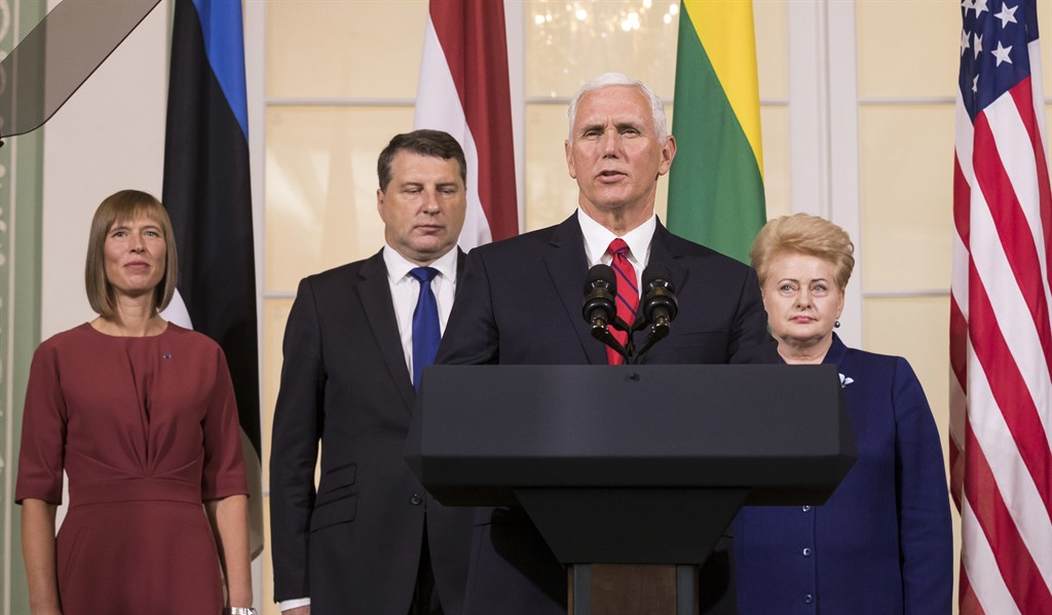The impact from Russian attempts to interfere in the 2016 election continues to roil more than just Washington DC and the US media. Vice President Mike Pence traveled to the Baltic states for strategic meetings with heads of state of fellow NATO members to pledge US commitment to their security. Pence responded to the latest diplomatic maneuver from Moscow, about which more in a moment, and also acknowledged fears in the Baltic over Russian aggression:
VP Mike Pence makes remarks alongside leaders of Baltic states: "We hope for better days, for better relations with Russia" pic.twitter.com/EmX4WtFUY2
— NBC News (@NBCNews) July 31, 2017
Russia’s expulsion of American diplomats and embassy staff “won’t deter” U.S. commitments to its allies, Pence said Monday in a joint news conference with the presidents of Estonia, Latvia and Lithuania in Estonia’s capital, Tallinn. His visit is part of a tour of eastern Europe that culminates Wednesday in Montenegro with a meeting of Balkan NATO members and aspirants.
Russia’s annexation of Crimea and involvement in the conflict in eastern Ukraine triggered a rethink of NATO’s role in ex-communist Europe. The response was to add troops from the U.S and the U.K. in nations such as Estonia and Latvia, unwilling former Soviet republics that retain large Russian-speaking minorities. While recently backing NATO’s collective-security pledge, remarks by President Donald Trump have in the past raised doubts about the U.S.’s commitment to the alliance.
“No threat looms larger in the Baltic states than the specter of aggression from your unpredictable neighbor to the east,” Pence said. “At this very moment, Russia continues to seek to redraw international borders by force, undermine democracy of sovereign nations and divide the free nations of Europe one against another.”
This is little in this which should even be debatable, let alone controversial. Vladimir Putin himself declared Russia the guarantor of human rights for Russian ethnic minorities more than three years ago. At first, that was only to seize Crimea, but Putin then used the same pretext to invade the Donbass region in eastern Ukraine and support a breakaway movement from Kyiv. Ever since Putin got away with that, he’s been eyeing the Baltic states. Last year, Putin ordered nuclear exercises on the Estonian border, using the Russian enclave of Kaliningrad to remind the Baltics of Russian strength through Belarus. The US and NATO responded by shifting troops into Estonia in October, but Putin has yet to back down.
Meanwhile, Russia codified its diplomatic response to new sanctions passed by Congress last week, as well as their delayed response to Barack Obama’s expulsion of 35 diplomats in December. The US will have to eliminate 755 positions in its diplomatic operations, but the main impact of that may be Russian joblessness:
President Vladimir Putin said 755 US diplomats must leave Russia and warned ties with Washington could be gridlocked for a long time, in a move Sunday that followed tough new American sanctions.
The Russian foreign ministry had earlier demanded Washington cut its diplomatic presence in Russia by September to 455 — the same number Moscow has in the US.
“More than a thousand people were working and are still working” at the US embassy and consulates, Putin said in an interview with Rossia-24 television.
“755 people must stop their activities in Russia.”
Not all of those are Americans; in fact, it appears that most of those people would be Russian civilian employees for the US operations in Russia. That may not be an entirely wise move on Putin’s part, especially with an economy that is getting battered by sanctions already. As former US ambassador to Russia Michael McFaul pointed out on NBC’s Today show, it will also hurt Russia in other ways, such as applications for visas to travel to the US. He then wonders why Russia has lashed out in an “asymmetric” manner. After all, McCaul says, “we didn’t meddle in their election”:
WATCH: “We didn’t meddle in their election, so why are our diplomats being punished?” Michael @McFaul on Russia pic.twitter.com/jr2oQyM02n
— TODAY (@TODAYshow) July 31, 2017
"It's huge," former US Ambassador to Russia @McFaul on Putin expelling 755 US Embassy staff via @TODAYshow https://t.co/UkYabUxaed
— NBC News (@NBCNews) July 31, 2017
That’s a rather silly and naïve question to ask. Putin has openly accused Hillary Clinton of trying to interfere in the 2012 Russian election while Secretary of State by attacking Putin publicly. Whether or not that’s true or fair is beside the point; the US has turned election interference into a five-alarm fire with constant raging against Russia, and Russia is now responding in kind. The point of the “huge” reduction is clearly to enforce symmetry where it had not been enforced before, ending a surprisingly lax diplomatic approach to formal relations.
It’s a Cold War-ish stance to be sure, but it’s also a wake-up call to the rest of the world — or at least to the US. It’s been clear since Crimea that Putin plans to claw back the old Soviet republics through force or the threat of it and to take on the US in order to regain superpower status, at least in Putin’s mind. We seem to be the last to recognize this. Ask the Baltic states if they need a wake-up call.







Join the conversation as a VIP Member